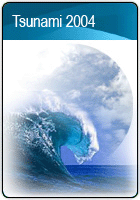 |
EWS HOME |
|
..................................................... |
 |
BACKGROUND |
|
.................................................... |
 |
PROGRAM
COMPONENTS |
|
.................................................... |
 |
PROGRESS UPDATES |
|
|
|
|
.................................................... |
 |
PROJECTS |
|
|
|
|
.................................................... |
 |
PROFESSIONAL
TRAINING |
|
.................................................... |
 |
PARTNERSHIPS |
|
.................................................... |
 |
MONTHLY UPDATES
ARCHIVE |
|
.................................................... |
 |
OUR
PEOPLE
|
|
.................................................... |
 |
CONTACT US
|
|
.................................................... |
|
BACKGROUND
The catastrophic
Indian Ocean tsunami of 26 December 2004 united
governments and peoples in addressing its
unprecedented impacts. The devastating event, a
rare occurrence in the Indian Ocean region,
brought to the fore the lack of knowledge of and
awareness about the hazard and, consequently,
the lack of response capabilities, particularly
of first responders and authorities who dealt
with the large-scale emergency. Government
leaders in the region were of the consensus that
a tsunami early warning system is needed to
prepare communities and authorities to respond
to the hazard, and minimize loss of lives and
destruction of property. The Special ASEAN
Leadersí Meeting on the Aftermath of the
Earthquake and Tsunami (6 January 2005, Jakarta)
and the Ministerial Meeting on Regional
Cooperation on Tsunami Early Warning
Arrangements (28-29 January 2005, Phuket)
expressed their commitments to establish an
early warning system for the Indian Ocean and
the Southeast Asian regions. This resolve was
echoed by several regional and international
forums that followed.
Top
Proposed Tsunami Early
Warning System in the Indian Ocean and Southeast
Asia
The Ministerial Meeting in Phuket agreed to take
immediate and practical steps towards the
establishment of a tsunami early warning system
in the Indian Ocean and Southeast Asia. The
Meeting provided guidance that such arrangement
should build on existing institutions and
mechanisms, strengthen and upgrade national
systems, link national mechanisms with
sub-regional and regional capabilities,
integrate early warning with preparedness,
mitigation and response (end-to-end), and must
be integrated into existing warning systems to
promote a multi-hazard approach to make the
system sustainable.
The meeting recognized the Asian Disaster
Preparedness Centerís (ADPC) readiness to serve
as a regional center or focal point for a
multi-nodal tsunami early warning arrangement in
the region, and its goal to strengthen its
capacity, including the incorporation of
additional technological capabilities. (Prior to
the ASEAN Leadersí Meeting in Jakarta, the Royal
Thai Government (RTG) requested ADPC to support
the development of Thailandís national tsunami
early warning capabilities and play a role as a
regional center or focal point in establishing
and operating a tsunami early warning system in
the Indian Ocean and Southeast Asia.
Subsequently, the RTG brought this proposal
before the Special ASEAN Leadersí Meeting in
Jakarta and in the Ministerial Meeting in Phuket.)
Also, in the Ministerial Meeting in Phuket, the
RTG proposed the setting up of a Voluntary Trust
Fund, with UN-ESCAP as fund administrator, into
which countries may contribute to promote
predictable funding for the regional tsunami
early warning system and to strengthen national
and regional capacities in early warning, and
pledged US$10 million as seed money.
Top
International
Efforts to Establish a Tsunami Early Warning
System
in the Indian Ocean
Coordination of efforts to establish a tsunami
warning and mitigation system in the Indian
Ocean rests with UNESCOís Intergovernmental
Oceanographic Commission (UNESCO/IOC). The first
International Coordination Meeting for the
development of the Indian Ocean Tsunami Warning
and Mitigation system (IOTWS) was held in Paris
from 3-8 March 2005, followed by a second
meeting in Mauritius from 14-16 April 2005.
These meetings agreed on a framework for the
IOTWS as consisting of a coordinated network of
national systems and capacities, with Member
States having the responsibility for warning
issuance and dissemination within their
respective territories, utilizing or building on
existing institutions and complementing existing
warning frameworks, within a multi-hazard
approach. The Intergovernmental Coordination
Group (ICG) for the IOTWS, composed of
interested IOC Member States from the Indian
Ocean Region, will govern the system, with the
IOC Secretariat as secretariat. The IOTWS/ICG
was established by the 23rd session of the IOC
Assembly from 21-30 June 2005, and held its
first meeting in Perth, from 3-5 August 2005,
and its second meeting in Hyderabad, India from
14-16 December 2005.
Top
Expressed Need for
Tsunami Early Warning System
in Southeast Asia
The Ministerial Meeting in Phuket agreed to take
immediate and practical steps towards the
establishment of a tsunami early warning system
in the Indian Ocean and Southeast Asia. The
Meeting provided guidance that such arrangement
should build on existing institutions and
mechanisms, strengthen and upgrade national
systems, link national mechanisms with
sub-regional and regional capabilities,
integrate early warning with preparedness,
mitigation and response (end-to-end), and must
be integrated into existing warning systems to
promote a multi-hazard approach to make the
system sustainable.
The meeting recognized the Asian Disaster
Preparedness Centerís (ADPC) readiness to serve
as a regional center or focal point for a
multi-nodal tsunami early warning arrangement in
the region, and its goal to strengthen its
capacity, including the incorporation of
additional technological capabilities. (Prior to
the ASEAN Leadersí Meeting in Jakarta, the Royal
Thai Government (RTG) requested ADPC to support
the development of Thailandís national tsunami
early warning capabilities and play a role as a
regional center or focal point in establishing
and operating a tsunami early warning system in
the Indian Ocean and Southeast Asia.
Subsequently, the RTG brought this proposal
before the Special ASEAN Leadersí Meeting in
Jakarta and in the Ministerial Meeting in Phuket.)
Also, in the Ministerial Meeting in Phuket, the
RTG proposed the setting up of a Voluntary Trust
Fund, with UN-ESCAP as fund administrator, into
which countries may contribute to promote
predictable funding for the regional tsunami
early warning system and to strengthen national
and regional capacities in early warning, and
pledged US$10 million as seed money.
Top |
|

Topic in this page |
|
|
|

